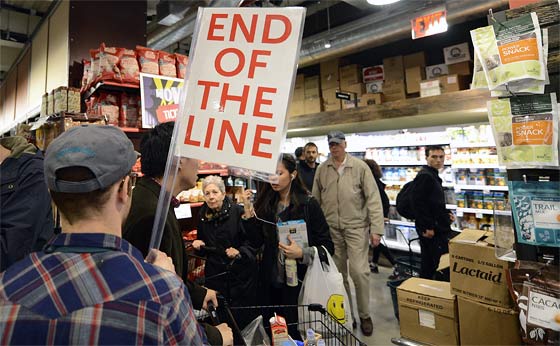10 Things That Non-Preppers Will Strip From Store Shelves

Immediately following a regional (or wider) SHTF disaster, when the realization sets in that the consequences are going to last for more than just a few days, there will be many items disappearing from store shelves – and fast…
Preppers are already prepared to an extent. But what about non-preppers?
What things will they consider to be priorities when they panic to the store?
(re-posted for your additional comment…)
Non-preppers are not survival-preparedness oriented and mostly will not think much beyond the here and now. When rushing to the store, they will think about their habitual needs.
These ten things, or categories, might be some of the first to disappear from store shelves by the panicked hoards. In no particular order,
FOOD
Milk, bread, and eggs always go first. The day before any predicted snowstorm, those aisles will be stripped.
WATER
Cases (flats) of bottled potable water will be quick to disappear from shelves.
FLASHLIGHTS, BATTERIES
Along with lanterns and candles, all flashlights will be a hot commodity in any post-disaster scenario. Batteries will fly off the shelves just as quickly as flashlights; also purchased to power portable radios.
GASOLINE
People will fill their gas tanks if the pumps are running, and some will fill gas cans. During hurricane Sandy for example, some gas stations were hand pumping gasoline out of their holding tank for customers. This was a very hot commodity.
ALCOHOL
Got to feed that addiction…
CIGARETTES
Got to feed that addiction…
ICE, COOLERS
With questionable electricity, coolers and ice will go quickly, despite the fact that this will buy them little time, so to speak, without making new ice.
CHARCOAL, PROPANE
Many people have a BBQ grill for cooking, and will think to buy charcoal or fill their grill’s propane tank if they can.
BABY SUPPLIES
Disposable diapers, baby formula, etc. will go very quickly for those with babies.
TOILET PAPER
Can’t imagine life without it…
It is an interesting exercise to imagine what non-preppers may think to buy when they first run to the store after a disaster. There are several factors which will affect their decisions, such as the season and time of year, whether or not they’ve lost electricity, the extent of the disaster, their thoughts as to how long it may last, etc.
What do you think they will buy first? Don’t think of it from a prepper mindset, but think what the ordinary folks will consider to be their initial priorities… what goes first?
